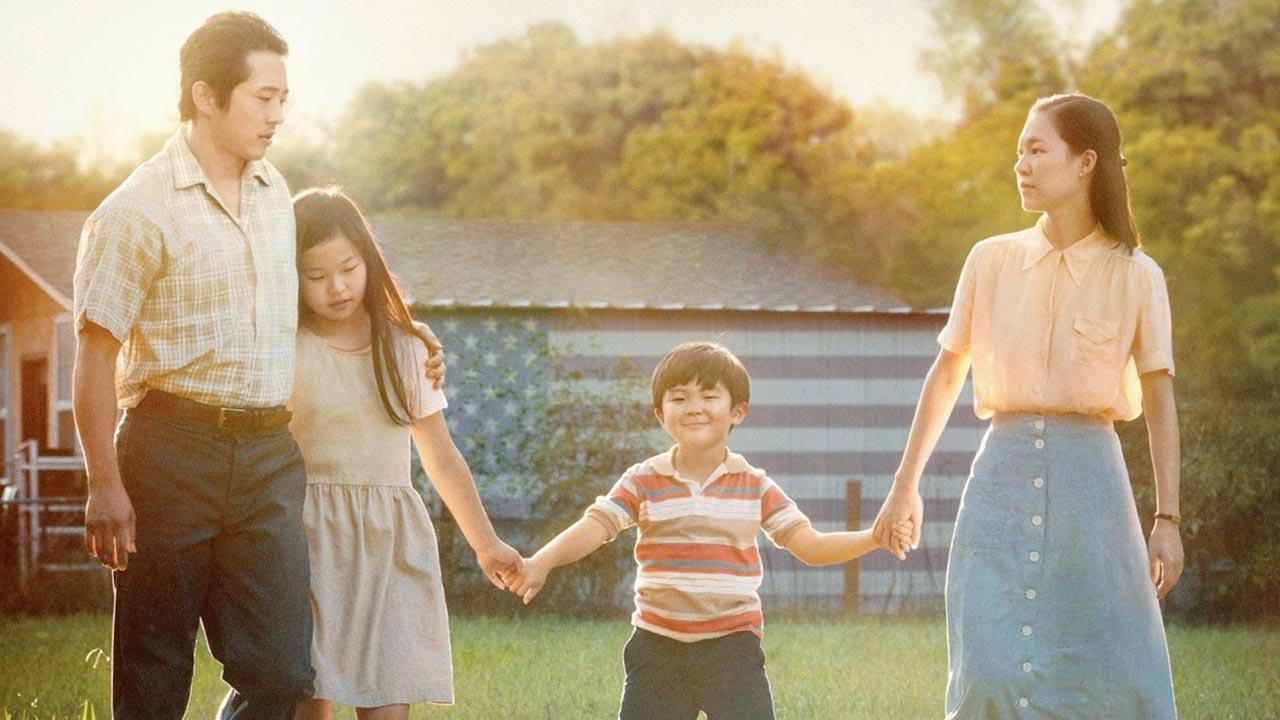Minari is a touching immigrant story about a Korean-American couple Jacob and Monica, who came from Korea to California in the 1980s and make the move to the rugged Ozark countryside in Little Rock Arkansas, with their two American-born children, in pursuit of their very own American Dream.

A still from Minari
Minari
Cast: Steven Yeun, Han Ye-ri, Youn Yuh-jung, Will Patton, Alan Kim, Noel Kate Cho, Scott Haze, Darryl Cox
Director: Lee Isaac Chung
Rating: ****
ADVERTISEMENT
The film that could propel Korean talent to yet another mainstream Oscar victory, ‘Minari,’ with executive producer Brad Pitt vouching for it, is a touching immigrant story about a Korean-American couple Jacob (Steven Yeun) and Monica (Yeri Han), who came from Korea to California in the 1980s and make the move to the rugged Ozark countryside in Little Rock Arkansas, with their two American-born children, a serious and mature girl named Anne (Noel Kate Cho) and a six-year-old named David (newcomer Alan S. Kim), in pursuit of their very own American Dream. Trying to run the 50 acre farm, working alongside as chicken ‘sexers’ ( segregating chicks as per their gender), and with a geriatric relative moving into their mobile home, the family find the going extremely tough and challenging. But then the American Dream wouldn’t be one if there was no honest hard-work and perseverance accompanying it…
Watch Minari Trailer
The film is in fact Lee Isaac Chung’s ode to his own childhood years, evocative of the intimate struggles and challenges involved in the immigrant life while staying true to Asian traditions of family, emotional intimacy and filial ties that override hardships and provide a secure base for a successful life ahead.
The film opens with a family travelling to their new destination through a green American landscape of open fields and miles of road without another human in sight. It’s a stunningly mesmerising stretch of film that expands into the intimate world of Jacob, Monica and family and the trials they overcome with understated reserve, dignity and resilience that typifies the Asian characteristic. Chung’s autobiographical drama highlights cultural identities and how people from an alien culture learn to adapt and adopt a new normal that they struggle to come to terms with. There’s an underlying tension that builds-up unassumingly, as the family go through their everyday routine, sharing in an ambition that is an assimilation of individual yearnings rather than a familial goal.
Chung clearly understands how culture and human behaviour play an important role in the well-being of the collective. As he introduces a third angle into play by way of the grandmother who comes to stay, the narrative plays out the challenges involved in merging the traditional and the western notion of family. While Jacob and Monica are happy and excited to have their beloved relative with them, the American born kids are not similarly enthused. As their lives play out, the characters learn to bond and blend with the people and landscape that lends them their sustenance.
Achingly beautiful atmospheric camerawork by Lachlan Milne combine well with a haunting piano-led score from Emile Mosseri and seemingly seamless editing by Harry Yoon, lending volatility, sincerity and dignity to a smoothly flowing narrative that gradually draws you in and makes you one with the characters. The performances are vividly poignant. While Steven Yeun and Yeri Han power Jacob and Monica’s individual and combined struggles, the kids provide emblematic counter-point, two other performances add nuanced brilliance to this uniquely distinctive experience. Will Patton is wonderful as an evangelical Christian farmer who praises Jesus at every turn and Yuh-Jung Youn as Soonja, Jacob’s grandmother, is remarkably catastrophic (as she is meant to be). Both performances jerk us out of the comfort zone and bring us face-to-face with the harsh realities of life. This one’s a gem for sure!
The writers try to reuse the same old punch lines in order to mine remembered laughter. While the race and class disparities largely remain in a post-Obama America, there’s a moving forward in a sense that this film is unable to capitalise on. Even the African Centrism exhibited in Zamunda feels out of place in the new world order. The use of musical numbers by En Vogue and Gladys Knight lend the film a feel of the late ’80s. When Director Craig Brewer runs out of sequences to recreate, he just relays the old clips and revives Murphy’s multiple identities’ shtick. And it’s neither memorable nor funny. The CG enhanced flashbacks fail to add novelty to a tired, limp, lacklustre experience. Eddie Murphy’s attempt to revive his career appears to be sinking under the weight of his own extraordinary history.
 Subscribe today by clicking the link and stay updated with the latest news!" Click here!
Subscribe today by clicking the link and stay updated with the latest news!" Click here!






